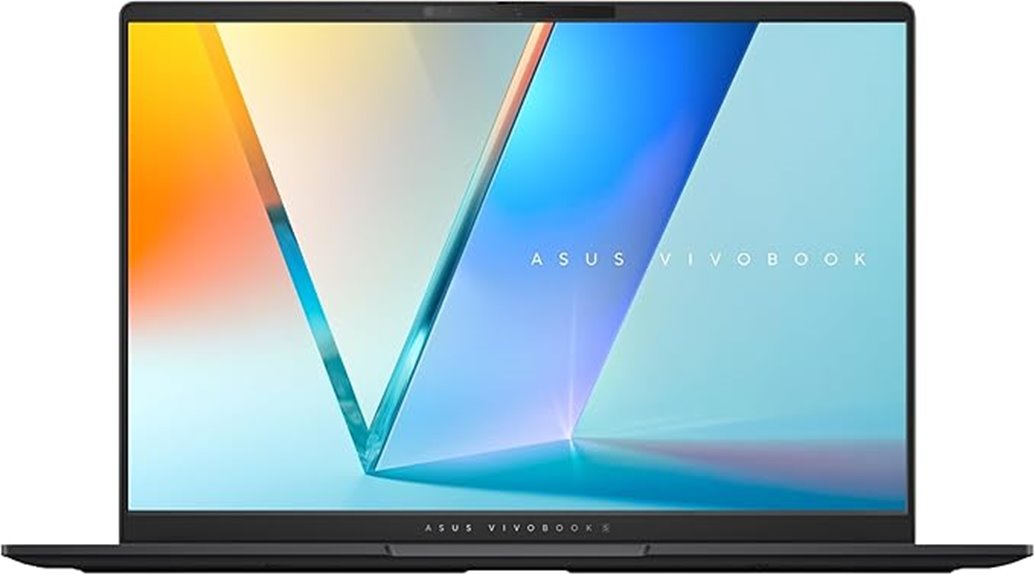Best Laptop for Recording Podcasts (Top 5 Picks for 2025)
If you’re looking for the best laptops for recording podcasts in 2025, consider the Apple 2024 MacBook Pro for its powerhouse M4 chip and stunning display. The Acer Swift X 14 offers efficient multitasking with its AI-enhanced webcam. The 2025 MacBook Air is sleek with impressive battery life. For a lightweight option, the ASUS Vivobook S 14 boasts an OLED screen, while the Samsung Galaxy Book4 Pro merges portability with high performance. Discover your perfect podcasting companion!
In the interest of full disclosure, we would like to inform you that some links on our website are affiliate links. By clicking on these links and completing a purchase from our partners, we may receive a nominal commission at no extra cost to you. Rest assured, our affiliate partnerships do not compromise the integrity of our editorial content or product evaluations. For further clarification, kindly refer to our comprehensive affiliate disclosure.
Table of Contents
What Are the Best Laptop for Recording Podcasts to Buy This Year?
Here are my top picks for the best laptop for recording podcasts, you can consider this year.
Apple MacBook Pro Laptop with M4 chip (14.2-inch Liquid Retina XDR Display)
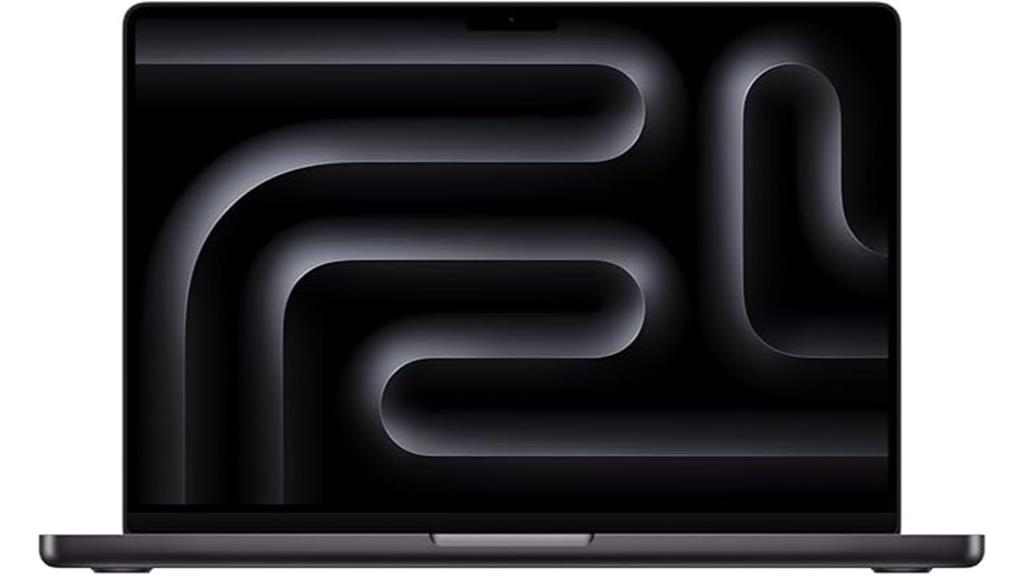
If you’re a podcaster looking for a powerful and reliable laptop, the Apple 2024 MacBook Pro with the M4 chip is an excellent choice. With its 10-core CPU and GPU, you’ll experience exceptional speed for multitasking and running demanding pro apps. The stunning 14.2-inch Liquid Retina XDR display, boasting 1600 nits peak brightness, ensures your visuals are crisp and vibrant. Plus, the all-day battery life means you can record and edit without worrying about power. Seamless integration with other Apple devices enhances your workflow, making it a perfect fit for your podcasting needs. You won’t be disappointed!
Best For: Podcasters and creative professionals seeking a powerful and reliable laptop for multitasking and demanding applications.
Pros:
- Exceptional speed for multitasking with the M4 chip’s 10-core CPU and GPU.
- Stunning 14.2-inch Liquid Retina XDR display with vibrant visuals and high brightness.
- All-day battery life allows for uninterrupted recording and editing.
Cons:
- Higher price point compared to other laptops in the market.
- Limited upgrade options for memory and storage post-purchase.
- May require learning curve for users new to macOS and the Apple ecosystem.
Acer Swift X 14 Laptop (SFX14-72G-77NJ)
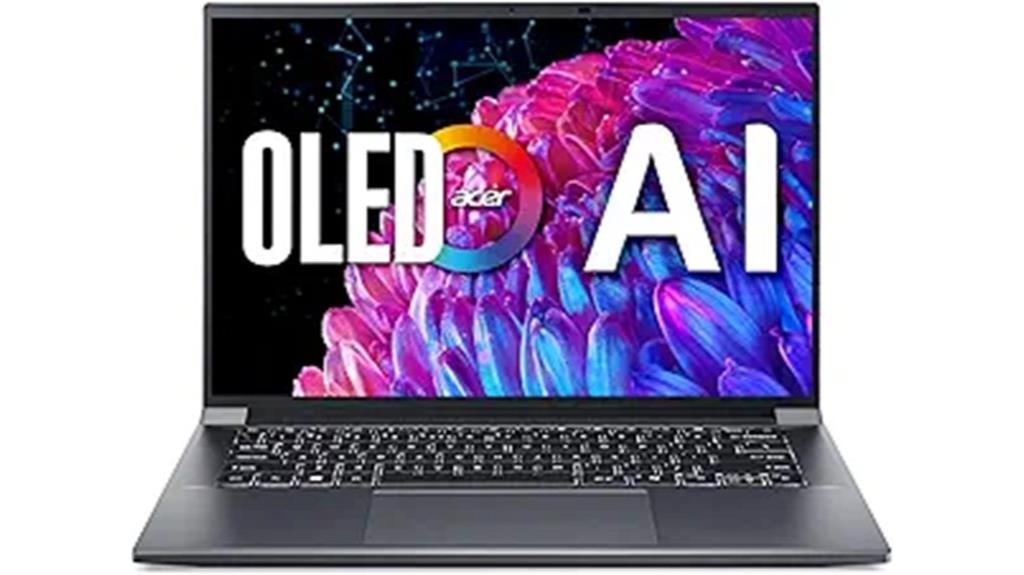
The Acer Swift X 14 Laptop (SFX14-72G-77NJ) stands out as an ideal choice for podcasters who demand high performance and exceptional audio quality. With its Intel Core Ultra 7 processor and NVIDIA GeForce RTX 4060 GPU, you’ll effortlessly handle demanding software. The 14.5-inch OLED display offers stunning visuals, while the TÜV Rheinland certified screen reduces eye strain. Plus, the 1080p FHD webcam and AI noise reduction ensure crystal-clear video calls. Equipped with 16GB of memory and a 1TB SSD, multitasking and fast storage become seamless. Enjoy advanced connectivity with Wi-Fi 6E and Bluetooth 5.3, keeping you connected and productive.
Best For: The Acer Swift X 14 Laptop (SFX14-72G-77NJ) is best for podcasters and creators seeking high performance and exceptional audio-visual quality.
Pros:
- High-performance Intel Core Ultra 7 processor and NVIDIA GeForce RTX 4060 GPU for demanding applications.
- Stunning 14.5-inch OLED display with TÜV Rheinland certification for reduced eye strain and enhanced color accuracy.
- Excellent connectivity options with Wi-Fi 6E and Bluetooth 5.3 for seamless online collaboration.
Cons:
- The 14.5-inch screen size may be limiting for users who prefer larger displays for extensive multitasking.
- The premium specifications may come at a higher price point compared to entry-level laptops.
- Limited upgrade options for internal components due to the laptop’s slim design.
Apple 2025 MacBook Air 15-inch Laptop with M4 Chip
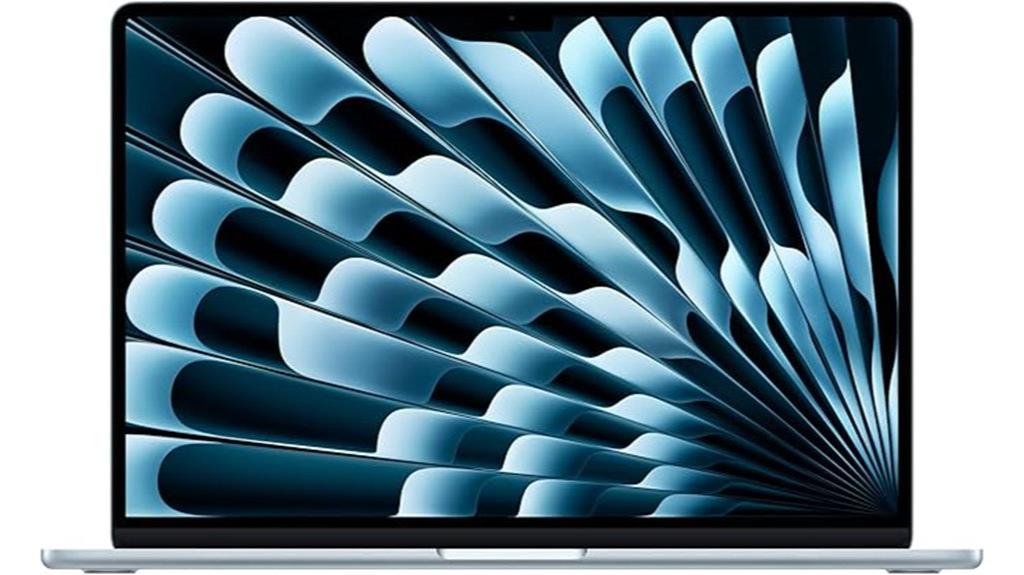
For podcasters seeking a powerful and reliable tool, the Apple 2025 MacBook Air 15-inch with M4 Chip stands out. Its impressive performance ensures fluid multitasking, allowing you to edit audio and video seamlessly. With up to 18 hours of battery life, you won’t be tethered to an outlet during long recording sessions. The stunning 15.3-inch Liquid Retina display brings your visuals to life, showcasing rich colors and sharp details. Plus, the 12MP Center Stage camera and Spatial Audio provide high-quality visuals and sound for your podcasts. With robust privacy features and multiple connectivity options, this laptop truly has it all.
Best For: Podcasters and content creators looking for a powerful, portable laptop that excels in audio and video editing.
Pros:
- Enhanced performance with the M4 chip for smooth multitasking and editing.
- Stunning 15.3-inch Liquid Retina display offers vibrant colors and sharp visuals.
- Long battery life of up to 18 hours, perfect for extended recording sessions.
Cons:
- Limited upgrade options due to non-user replaceable components.
- Higher price point compared to some other laptops in its class.
- Potential overkill for users with basic computing needs.
ASUS Vivobook S 14 OLED Slim Laptop (M5406WA-DS76)
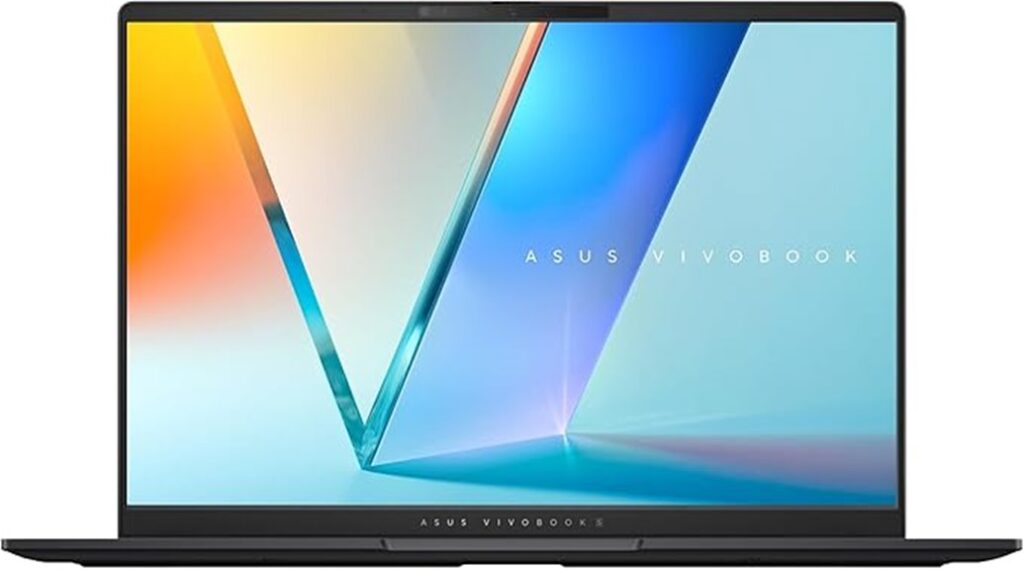
Recording high-quality podcasts requires a laptop that can handle demanding tasks, and the ASUS Vivobook S 14 OLED Slim Laptop (M5406WA-DS76) steps up to the challenge with its powerful AMD Ryzen 9 365 processor and 24GB of RAM. You’ll appreciate the stunning 14” 3K OLED display, delivering vibrant colors and sharp details, perfect for editing audio and video. At just 0.63” thick and 2.87 lbs, it’s highly portable, making it easy to take along for interviews. Plus, the customizable RGB backlit keyboard ensures an ergonomic typing experience, while the ample connectivity options keep you connected on the go.
Best For: Content creators and podcasters looking for a powerful and portable laptop that excels in performance and display quality.
Pros:
- High-performance AMD Ryzen 9 processor and 24GB of RAM for seamless multitasking and demanding applications.
- Stunning 14” 3K OLED display with vibrant colors and high brightness, ideal for video and audio editing.
- Lightweight and slim design makes it easy to carry for on-the-go recording and interviews.
Cons:
- Limited storage capacity of 512GB SSD may require external solutions for large audio/video projects.
- Single-zone RGB backlighting may not provide the level of customization some users desire.
- Price point may be higher compared to similar models with less powerful specifications.
Samsung Galaxy Book4 Pro Business Laptop (NP944XGK-KG4US)
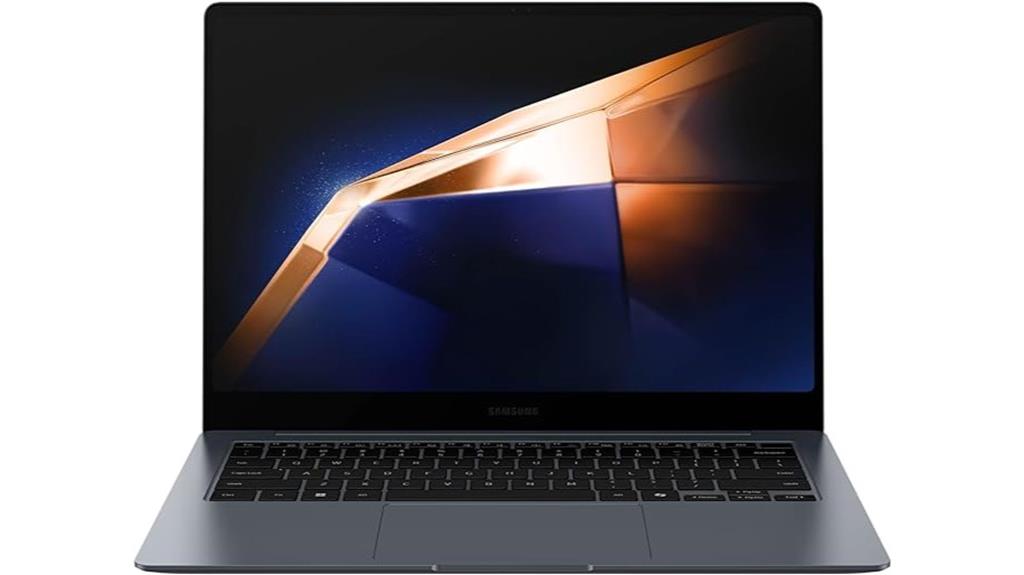
If you’re a podcaster seeking a powerful and portable laptop, the Samsung Galaxy Book4 Pro is an excellent choice. With its Intel Core Ultra 7 processor and 32GB of RAM, it handles multitasking with ease. The stunning 14-inch 3K AMOLED touchscreen ensures clear visuals during video calls and editing. Weighing just 2.71 lbs, it’s designed for professionals on the go. Plus, its long-lasting battery provides about 8 hours of use, while fast charging keeps you powered up quickly. With robust security features like Samsung Knox, your data remains safe, making it a reliable option for your podcasting needs.
Best For: Professionals and podcasters in need of a powerful, portable laptop for multitasking and video editing on the go.
Pros:
- Exceptional performance with Intel Core Ultra 7 processor and 32GB RAM for seamless multitasking.
- Vibrant 14-inch 3K AMOLED touchscreen for clear visuals during video calls and editing.
- Lightweight design at just 2.71 lbs, making it easy to carry around.
Cons:
- Higher retail price ($1749) compared to competitors offering similar specs.
- Limited RAM upgrade options in certain regions, capped at 16GB.
- Perceived low quality of the OEM SSD from Western Digital for the price point.
READ MORE: Best Laptop for Influencers, Best Laptop for Excel Spreadsheets, Best Laptop for Dropshipping Busines, Best Laptop for Data Science Students, Best Laptop for Data Engineer, Best Laptop for Blogging and Podcasting, Best Laptop for Dental School, Best Laptop for Grandma, Best Laptop for Full Stack Developer, Best Laptop for Fruity Loops
Factors to Consider When Choosing the Best Laptop for Recording Podcasts
When you’re choosing a laptop for recording podcasts, several key factors can make a big difference. You’ll want to think about audio quality, portability, battery life, processing power, and display clarity to ensure a smooth recording experience. Let’s break down each of these aspects to help you find the right fit for your podcasting needs.
Audio Quality Importance
Audio quality plays a pivotal role in the success of your podcast, directly influencing listener engagement and retention. Research shows that poor audio can lead to a 30% drop in audience retention rates. To ensure clarity, consider using a laptop with a high-quality built-in microphone or an external audio interface. This can significantly enhance sound quality and reduce background noise. Aim for recording equipment with a frequency response of 20 Hz to 20 kHz to capture the full spectrum of the human voice. Don’t overlook noise-canceling technology, which can eliminate unwanted sounds for cleaner recordings. Lastly, ensure your laptop has enough processing power and RAM to handle audio editing software smoothly, allowing you to manage multiple tracks without distortion.
Portability and Weight
High-quality audio is only part of the equation for a successful podcast; portability and weight of your recording equipment matter just as much. If you plan to record on the go, aim for a lightweight laptop that weighs around 2.5 to 3.5 pounds. A slim profile, ideally under 0.7 inches thick, makes it easier to slip into your bag and carry wherever you need. Plus, laptops with a compact design allow for quick setups in various environments, whether you’re in a café or your home studio. Look for models featuring integrated webcams and microphones, so you won’t need extra gear. The right balance of portability and functionality can significantly enhance your podcasting experience.
Battery Life Considerations
While you might focus on audio quality, battery life plays an equally vital role in your podcasting setup. Long recording sessions can drain your laptop quickly, so aim for one with at least 8-12 hours of battery life. This ensures you can record and edit multiple episodes without the hassle of frequent recharging. Look for laptops with energy-efficient processors, as they maintain performance while optimizing battery usage during demanding tasks like audio editing. Fast charging capabilities can also provide a quick boost during breaks, keeping you on schedule. Lastly, consider the laptop’s weight and portability; lighter models typically prioritize efficiency, granting you longer battery life for on-the-go podcasting without interruptions.
Processing Power Needs
When selecting a laptop for recording podcasts, processing power is a key factor that can significantly impact your workflow. You’ll want at least a quad-core processor to efficiently multitask and handle audio files without lag. Higher clock speeds, measured in GHz, also enhance your laptop’s ability to process audio data quickly, reducing latency during recording and playback. Additionally, consider integrated graphics processing units (GPUs); they can offload some rendering tasks from the CPU, boosting performance in audio applications that include visual elements. Don’t overlook RAM either—aim for at least 16GB to support your audio editing software and prevent slowdowns when running multiple tracks and plugins during recordings. Choosing wisely here ensures a smoother podcasting experience.
Display Clarity Features
Choosing a laptop with excellent display clarity features can make a significant difference in your podcasting experience. A high-resolution display, like 2880 x 1800, ensures you can easily read scripts and notes while recording. Look for peak brightness levels of 600 nits or higher to enhance visibility and reduce glare in various lighting conditions. An OLED display offers better color accuracy and contrast ratios, making your visuals vibrant and easy to see. Additionally, features like TÜV Rheinland certification can help reduce eye strain during long sessions. Finally, a high refresh rate of 120Hz provides smoother navigation when you’re interacting with editing software or presentation materials, ensuring your workflow remains seamless and efficient.
Connectivity Options Available
A high-quality display can enhance your podcasting workflow, but connectivity options are just as important. Look for laptops with multiple USB ports, including USB-A and USB-C, to easily connect your microphones, headphones, and other recording gear. Thunderbolt 4 ports are a great feature, offering high-speed data transfer and supporting multiple devices at once—perfect for your podcasting setup. Don’t forget to ensure the laptop has an audio jack; this is essential for connecting professional microphones and monitoring audio through headphones during recordings. Built-in microphones and webcams can also be handy for remote interviews when external equipment isn’t available. Lastly, a microSD card slot helps you quickly transfer large audio files without needing extra adapters.
Software Compatibility Requirements
While considering the best laptop for recording podcasts, it’s crucial to ensure that it supports the software you’ll rely on for editing and mixing. Look for compatibility with major audio editing programs like Audacity, Adobe Audition, or GarageBand. Also, check if the laptop can work with digital audio interfaces and microphones, as these often need specific drivers. The operating system matters too; some software might only be available on Windows or macOS, which could limit your choices. Ensure the laptop has enough RAM and processing power to handle multi-track recordings and real-time audio processing. Finally, if you plan to include remote guests or video elements, make sure it can run video conferencing and streaming software seamlessly.
Frequently Asked Questions
What Audio Software Is Best for Podcast Recording?
When choosing audio software for podcast recording, consider options like Audacity, Adobe Audition, or GarageBand. Each offers unique features, so you’ll want to explore them and decide which fits your style and needs best.
Do I Need an External Microphone for Better Sound Quality?
Yes, you’ll definitely benefit from an external microphone for better sound quality. Built-in mics often lack clarity and richness. Investing in a good mic can elevate your recordings, making your podcast sound more professional and engaging.
Can I Record Podcasts on a Chromebook?
Yes, you can record podcasts on a Chromebook. With the right software and a decent microphone, you’ll capture good sound quality. Just ensure your Chromebook has enough processing power for smooth recording and editing.
How Much Storage Do I Need for Podcast Episodes?
You’ll need at least 100GB of storage for podcast episodes, especially if you record multiple shows. Higher quality audio files and editing software can quickly eat up space, so plan accordingly to avoid running out.
What Accessories Enhance Podcast Recording on a Laptop?
To enhance your podcast recording, consider investing in a quality microphone, headphones for monitoring, an audio interface for better sound, and pop filters to reduce noise. These accessories significantly improve your audio quality and overall experience.
My Final Opinion
In conclusion, when choosing the best laptop for recording podcasts, keep in mind your specific needs, such as performance, portability, and audio quality. Each of our top picks for 2025 offers unique features that cater to different preferences and budgets. Whether you prefer a powerful MacBook or a sleek Acer, you’ll find a laptop that suits your podcasting style. Make the right choice, and you’ll elevate your podcasting experience to the next level!
